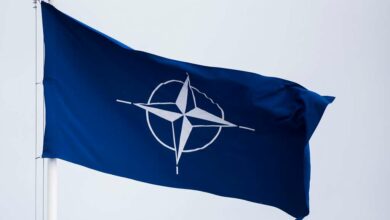Washington – Challenging presidential power, a defiant US House voted overwhelmingly Friday to deny President Barack Obama the authority to wage war against Libya. But Republicans fell short in an effort to actually cut off funds for the operation in a constitutional showdown reflecting both political differences and unease over American involvement.
In a repudiation of their commander in chief, House members rejected a measure to authorize the Libya mission for a year while prohibiting US ground forces in the North African nation, a resolution Obama had said he would welcome.
The vote was 295-123 with 70 Democrats abandoning the president just one day after Secretary of State Hillary Rodham Clinton had made an unusual appeal to rank-and-file members. A Senate committee is to consider the same resolution next Tuesday and is expected to support it, raising the prospect of conflicting messages from Congress.
Friday's votes showed lawmakers' concerns about an open-ended US commitment to a civil war between Muammar Qadhafi and rebel forces looking to oust him – as well as growing weariness among Americans with drawn-out conflicts in Iraq and Afghanistan.
In addition, the resounding number rejecting the authority resolution was a clear sign of anger toward the president for failing to seek congressional consent for the operation within 60 days, as stated in the 1973 War Powers Resolution. Republicans and Democrats argued that an arrogant Obama had run roughshod over the Constitution, ignoring the authority of the legislative branch that the founding fathers had insisted has the power to declare war.
While Republican as well as Democratic presidents have often ignored the War Powers Resolution, a frustrated House voted earlier this month to rebuke Obama for failing to provide a "compelling rationale" for the Libyan mission and for launching US military forces without congressional approval. They requested a report to Congress on the operation.
Obama further incensed lawmakers last week when he said he didn't need authorization because the operation did not rise to full-blown hostilities, a decision he reached by overruling some of his advisers.
It's not about Qadhafi, foes of the authorization said.
"I support the removal of the Libyan regime. I support the president's authority as commander in chief, but when the president chooses to challenge the powers of the Congress I, as speaker of the House, will defend the constitutional authority of the legislature," said Speaker John Boehner, R-Ohio.
Added Rep. Tom Rooney, R-Fla.: "The last thing that we want as Americans is for some president, whether it's this president or some future president, to be able to pick fights around the world without any debate from another branch of government."
The rejected money-cutoff bill, sponsored by Rooney, would have barred drone attacks and airstrikes but allowed the United States to continue actions in support of the NATO-led operation such as intelligence gathering, refueling and reconnaissance. The effort to cut off money was defeated, 238-180. While GOP leaders backed the measure, they didn't pressure Republicans to support it.
Supporting Obama, Democrats opposed to the votes argued that they would empower Qadhafi, aggravate NATO allies desperately needed in the fight in Afghanistan and send a dispiriting message to those who led the Arab spring uprisings in Tunisia, Egypt and elsewhere.
They reminded lawmakers of Qadhafi's role in the 1988 bombing of Pan Am Flight 103 and said he had American blood on his hands.
"The message will go all over the world, the message will go to Muammar Qadhafi, the message will go to our NATO allies, the message will go to every nation of the world that America does not keep faith with its allies," said Rep. Steny Hoyer of Maryland, the No. 2 Democrat in the House.
The authorization vote marked the first time since 1999 that either chamber had voted against backing a military action. The last time was to limit President Bill Clinton's authority to use ground forces in Kosovo. There will be no immediate effect on American involvement in the NATO-led mission in Libya, the same as in 1999.
Since NATO took command of the operation in early April, the US role has largely been limited to support efforts such as intelligence and electronic warfare. However, the US has launched airstrikes and drone attacks, flying more than 3200 sorties. The effort has included 39 drone attacks and 80 strikes with jet fighters.
The bill to cut off funds failed, in part, because several Republicans feared that even a vote for limited authorization for a NATO support mission amounted to support for the war effort.
"By dictating to President Obama how he can use American military forces in support of the NATO effort in Libya, we would authorize him to continue the same mission he has been carrying out for the past three months without congressional approval," said Rep. Scott Garrett, R-N.J.
The votes Friday were not the last word in the House. Lawmakers plan to target money for Libya when the House considers the defense spending bill the week of 4 July.
Reacting to the votes, Clinton said she would have preferred a different outcome on the authorization vote but was "gratified that the House decisively rejected" the bill to cut funds.
"We need to stand together across party lines and across both branches of government with the Libyan people and with our friends and allies and against Qadhafi," Clinton said.
In Benghazi, Libya, rebel spokesman Jalal al-Gallal, said he didn't know why the House voted against the authorization measure.
"America is the beating heart of democracy and should support the birth of a democracy in our time," he said. "I believe the American people will put the pressure on the government to change its mind."
White House spokesman Jay Carney said, "We think now is not the time to send the kind of mixed message that it sends when we're working with our allies to achieve the goals that we believe that are widely shared in Congress: protecting civilians in Libya, enforcing a no-fly zone, enforcing an arms embargo and further putting pressure on Gadhafi."
The authorization resolution mirrors a Senate measure sponsored by Sens. John Kerry, D-Mass., and John McCain, R-Ariz. The Senate Foreign Relations Committee will consider that resolution on Tuesday, and Senate Majority Leader Harry Reid, D-Nev., has indicated it has the panel's support.



